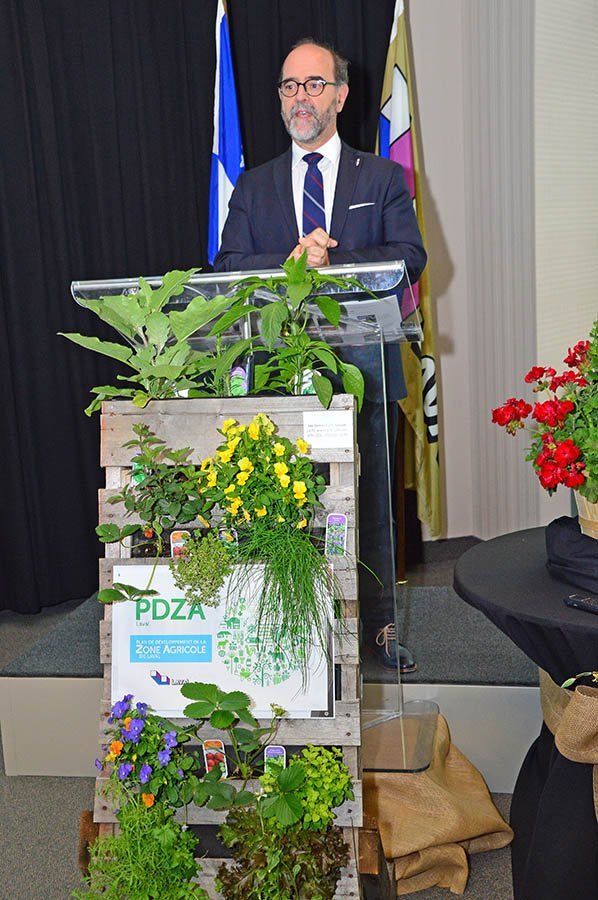Martin C. Barry
With displays of locally-grown flowers and produce, the City of Laval held a press conference at its commercial and industrial development headquarters on Chomedey Blvd. on June 13 to announce the beginning of a new policy for the protection and maintenance of the municipality’s extensive agricultural areas.
A change of policy
Developed in conjunction with local farmers and other interested parties, the policy comes following decades during which large expanses of agricultural territory in Laval were re-zoned and redeveloped for residential purposes by the ousted administration of former mayor Gilles Vaillancourt.
The city councillors who helped develop the new policy included Ray Kahlil (Sainte-Dorothée), Daniel Hébert (Marigot), Frédéric Gauthier (Auteuil), Aglaia Revelakis (Chomedey) and Michel Trottier (Fabreville), are often in districts where there are agricultural interests.

A unique characteristic
“This plan highlights the importance of Laval’s agricultural zone which is a distinctive characteristic of our area while also an important element of our economy,” said Mayor Marc Demers. Laval’s agricultural zone takes up 30 per cent of the island’s territory, includes more than 121 types of agricultural activity and has more than 53 produce stands operating.
“This is important for us since a third of our territory is zoned agricultural,” added Demers. “We have a big job to do in terms of the reconsolidation of it which is something we will be pursuing. On this territory we must increase the percentage of lands which are for agriculture. We must support our farmers closely in terms of the promotion of their products and their work, and it is their work will be supporting in an atmosphere of trust between them and the municipal administration.”
New emphasis on agriculture
According to city manager Serge Lamontagne, the arrival of Mayor Demers as Laval’s elected head three years began a process which led to a modification of the city’s master urban plan so as to give new importance to agricultural activities. “We now have more tools than before for improvements,” he said, while adding that each year over the next five years specific actions will be taken with regard to improving the situation the agricultural zone.
Among other things, Lamontagne said Laval’s real estate valuation department will be making it a priority next year to buy up agricultural land in some areas, consolidate it and take measures to safeguard and see that it is developed properly for agricultural purposes.
Change long overdue
“This has been coming for too long, so that is what we are going to do,” he said. He also spoke of the city developing new neighbourhood fruit and vegetable markets, as well as additional guidelines to better define the limits between agricultural zones and urban areas.
“We think this is a great opportunity to position ourselves as a city,” added Lamontagne, noting that Laval had the reputation decades ago of being Quebec’s market gardening capital. “Thirty per cent of or territory is agricultural and we have to do more with it.”



